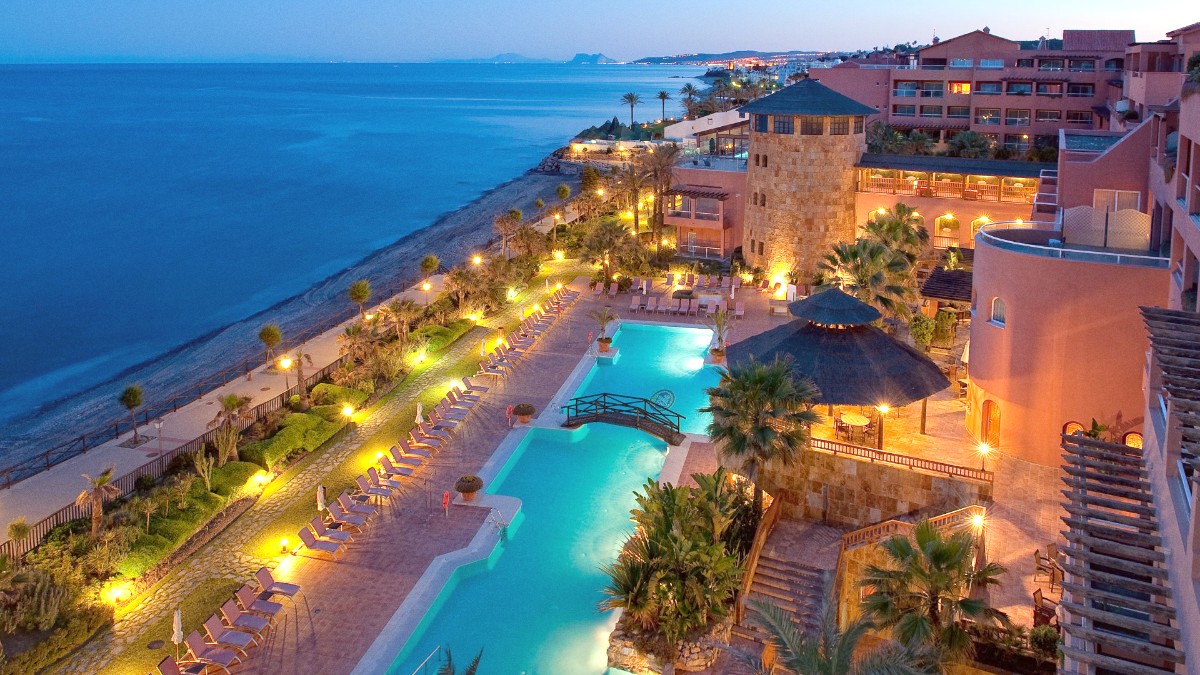
Andalucia, Spain
Estepona's food traditions are greatly shaped by its Mediterranean coast location. Fresh fish and seafood are abundant. The cuisine emphasizes fresh, simple ingredients, allowing natural flavors to come forward. It is a reflection of a rural and maritime past, now savored in a modern setting.
Flavors are typically fresh, clean, and rely on the high quality of ingredients, often enhanced with olive oil, garlic, and a touch of sea salt.
Lunch (almuerzo or comida) is the main meal, typically 2:00 PM - 4:00 PM. Dinner (cena) is a lighter meal, eaten late, usually from 8:30 PM onwards. Many restaurants close between lunch and dinner service.
Tapas are small plates with drinks, popular before lunch or dinner. Meals are social and unhurried. Expect a relaxed pace of service; do not rush. Waiters do not bring the bill until requested. Conversation at the table can be lively and loud, which is normal.
Bread is often served with meals. Sometimes a small charge applies (cubierto). Small portions of olives or breadsticks may also appear, sometimes incurring a charge.
An assortment of small, deep-fried local fish, lightly floured and crispy. Common types include sardines, anchovies (boquerones), baby squid (chanquetes), and hake. Best enjoyed in chiringuitos (beach restaurants) or traditional seafood restaurants in the Port.
A classic coastal delight!
Fresh sardines skewered on a cane stick and grilled over an open wood fire directly on the beach. This is a quintessential Estepona beach experience, especially in summer. Find them at outdoor grills at chiringuitos along the promenade.
A true taste of the sea!
Cold tomato-based soups, ideal for hot weather. Gazpacho is lighter; Salmorejo is thicker, bread-based. Ajoblanco is a refreshing cold white soup from almonds, garlic, olive oil, bread, and vinegar, often with grapes or melon. Most traditional restaurants offer these.
Cool and flavorful.
Tinto de Verano (red wine with lemon-lime soda), Sangria (wine punch), Local Wines (Ronda reds, Málaga sweet wines), Cerveza (Spanish beer), Horchata (tigernut drink, seasonal).
Churros con Chocolate (fried dough with hot chocolate), Helado (ice cream), Almendras Fritas (fried and salted almonds).
Estepona has a limited number of fine dining establishments compared to Marbella. Upscale hotels and restaurants in the Port area or just outside town present premium dining. They typically feature creative Spanish cuisine or international gourmet dishes.
Mid-range restaurants are plentiful throughout the Old Town, along the Paseo Marítimo, and in the Port. They present a variety of Spanish cuisine (especially seafood and traditional Andalusian dishes) and international options. Quality food and reasonable prices are characteristic.
Numerous tapas bars in the Old Town are excellent for budget-friendly dining. A satisfying meal can be assembled by ordering several tapas. Chiringuitos on the beach present fresh, affordable seafood, especially "espetos." Local supermarkets cater to self-catering.
A traditional market. Fresh produce, meat, and fish are for sale. Some stalls sell prepared food or offer simple, fresh meals at lunchtime. A good place to experience local life and gather ingredients.
Experience local life!
Interacting with local vendors offers insight into regional food culture.
Fresh, seasonal ingredients!
Pizzerias and pasta dishes are common.
Chinese, Japanese, Thai options are available.
Pubs with classic dishes.
Some German eateries. Indian food too.
Specific Halal or Kosher restaurants are few in Estepona. Travelers with these requirements may select vegetarian/fish options or self-cater using ingredients from larger supermarkets.
Limited specialized options.
Awareness of gluten-free ("sin gluten") and other allergens is growing. Many restaurants have allergen information on their menus or staff who advise. Supermarkets stock gluten-free products.
Carry a small card explaining restrictions in Spanish.
When ordering, double-check ingredients, especially for dishes that can contain hidden meat or dairy, like soups or sauces. Many restaurants are accommodating when informed clearly.
Larger supermarkets in Estepona often have dedicated sections for gluten-free, dairy-free, and organic products. Look for "Sin Gluten" labels.
Dining at a chiringuito on the beach, savoring freshly grilled "espetos de sardinas" with your feet almost in the sand.
Visit an almazara (olive oil mill) in the surrounding countryside for a tasting session.
Explore vineyards in the nearby Ronda region for wine production insights and tastings.
Align your meal times with local customs for the best atmosphere and freshest food. Dinner typically starts late, after 8:30 PM.
Enjoy a relaxed pace.
Ask locals for their favorite spots. This often leads to authentic and memorable dining experiences.
Discover hidden culinary gems!
Estepona's cuisine highlights local, seasonal ingredients, especially seafood.
Local beverages like Tinto de Verano refresh on warm days.
Don't miss churros con chocolate or local ice cream for a sweet ending.
Tipping is not obligatory but appreciated for good service. A small amount, usually a few euros or rounding up the bill, is customary for good service.